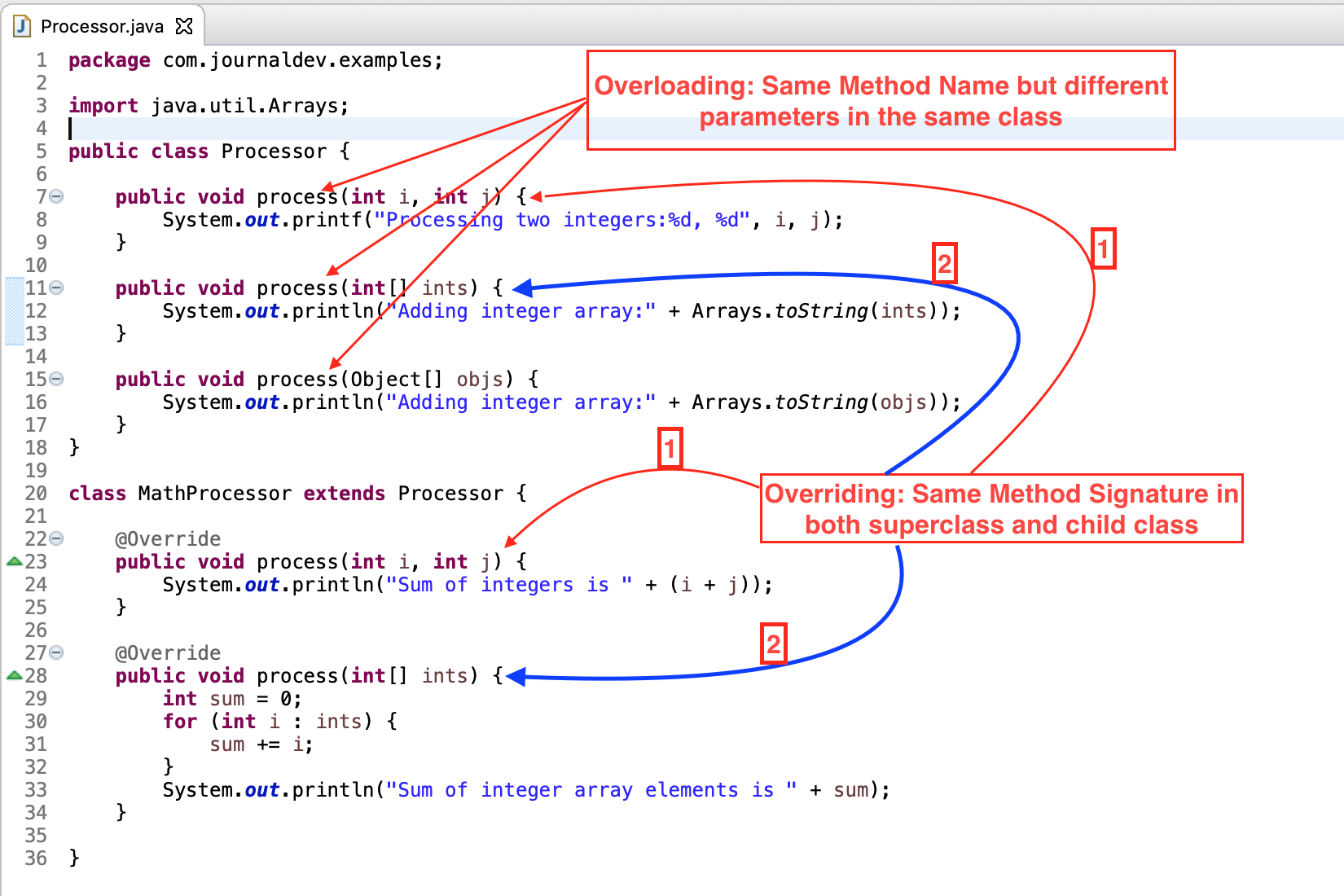- Log in to:
- Community
- DigitalOcean
- Sign up for:
- Community
- DigitalOcean
By Anish Singh Walia and Pankaj Kumar

Introduction
Overriding and overloading are the core concepts in Java programming. They are the ways to implement polymorphism in our Java programs. Polymorphism is one of the OOPS Concepts.

When the method signature (name and parameters) are the same in the superclass and the child class, it’s called overriding. When two or more methods in the same class have the same name but different parameters, it’s called overloading.
Comparing overriding and overloading
| Overriding | Overloading |
|---|---|
| Implements “runtime polymorphism” | Implements “compile time polymorphism” |
| The method call is determined at runtime based on the object type | The method call is determined at compile time |
| Occurs between superclass and subclass | Occurs between the methods in the same class |
| Have the same signature (name and method arguments) | Have the same name, but the parameters are different |
| On error, the effect will be visible at runtime | On error, it can be caught at compile time |
Overriding and overloading example
Here is an example of overloading and overriding in a Java program:
package com.journaldev.examples;
import java.util.Arrays;
public class Processor {
public void process(int i, int j) {
System.out.printf("Processing two integers:%d, %d", i, j);
}
public void process(int[] ints) {
System.out.println("Adding integer array:" + Arrays.toString(ints));
}
public void process(Object[] objs) {
System.out.println("Adding integer array:" + Arrays.toString(objs));
}
}
class MathProcessor extends Processor {
@Override
public void process(int i, int j) {
System.out.println("Sum of integers is " + (i + j));
}
@Override
public void process(int[] ints) {
int sum = 0;
for (int i : ints) {
sum += i;
}
System.out.println("Sum of integer array elements is " + sum);
}
}
Overriding
The process() method and int i, int j parameters in Processor are overridden in the child class MathProcessor. Line 7 and line 23:
public class Processor {
public void process(int i, int j) { /* ... */ }
}
/* ... */
class MathProcessor extends Processor {
@Override
public void process(int i, int j) { /* ... */ }
}
And process() method and int[] ints in Processor are also overridden in the child class. Line 11 and line 28:
public class Processor {
public void process(int[] ints) { /* ... */ }
}
/* ... */
class MathProcessor extends Processor {
@Override
public void process(Object[] objs) { /* ... */ }
}
Overloading
The process() method is overloaded in the Processor class. Lines 7, 11, and 15:
public class Processor {
public void process(int i, int j) { /* ... */ }
public void process(int[] ints) { /* ... */ }
public void process(Object[] objs) { /* ... */ }
}
Conclusion
In this article, we covered overriding and overloading in Java. Overriding occurs when the method signature is the same in the superclass and the child class. Overloading occurs when two or more methods in the same class have the same name but different parameters.
Thanks for learning with the DigitalOcean Community. Check out our offerings for compute, storage, networking, and managed databases.
About the author(s)
I help Businesses scale with AI x SEO x (authentic) Content that revives traffic and keeps leads flowing | 3,000,000+ Average monthly readers on Medium | Sr Technical Writer @ DigitalOcean | Ex-Cloud Consultant @ AMEX | Ex-Site Reliability Engineer(DevOps)@Nutanix
Java and Python Developer for 20+ years, Open Source Enthusiast, Founder of https://www.askpython.com/, https://www.linuxfordevices.com/, and JournalDev.com (acquired by DigitalOcean). Passionate about writing technical articles and sharing knowledge with others. Love Java, Python, Unix and related technologies. Follow my X @PankajWebDev
Still looking for an answer?
Nice, concise explanations. Referring my students here for this topic.
- Mark Miller
Great explanation of the topic. You made it simple and easy to understanding. Thank you.
- David
Its good but with an Example its better for more Understanding. Overall efforts are good.
- Shriganesh Mane
Thanks you. because l have irritating this concept understanding after that your implement concept and explain easy understanding ,so iam very happy
- ambika
Deploy on DigitalOcean
Click below to sign up for DigitalOcean's virtual machines, Databases, and AIML products.
Become a contributor for community
Get paid to write technical tutorials and select a tech-focused charity to receive a matching donation.
DigitalOcean Documentation
Full documentation for every DigitalOcean product.
Resources for startups and SMBs
The Wave has everything you need to know about building a business, from raising funding to marketing your product.
Get our newsletter
Stay up to date by signing up for DigitalOcean’s Infrastructure as a Newsletter.
New accounts only. By submitting your email you agree to our Privacy Policy
The developer cloud
Scale up as you grow — whether you're running one virtual machine or ten thousand.
Get started for free
Sign up and get $200 in credit for your first 60 days with DigitalOcean.*
*This promotional offer applies to new accounts only.
